Note
You always say that JKR's female characters have sexist characteristics, and I agree. Now I'm thinking, do the male characters have the same problem? I feel like we talk so much more about the female characters, because we analyse them from a feminist perspective. But are the male characters that much different?
When I think about a male character who gets portrayed in a sexist manner, of course Snape comes to mind. Because he doesn't have traditionally masculine traits, and often gets treated as too emotional or "hysterical", even in the moments he has every right to be angry. Do we have any other examples?
Ohhh my friend, you just pick my favorite topic: gender roles in fiction. This is gonna be so long that's because i didn't answered before. But what can I say? I love gender analysis. Well, the sexism in Harry Potter doesn't just harm or flatten its female characters, it also shapes the men in rigid, gendered ways. The narrative tells us what kinds of men deserve praise and which ones deserve ridicule or punishment, and those judgments often mirror traditional, patriarchal ideals of masculinity.
Severus is a prime example. He’s written with traits that are culturally coded as unmasculine: emotional intensity, awkwardness, deep attachment, and vulnerability. But instead of being treated with compassion or complexity, he’s portrayed as bitter, obsessive, even “pathetic.” His grief, rage, and isolation are often mocked or pathologized, rather than explored. The narrative treats his emotions as excesses, as if he should be more stoic, more composed—more “manly.” This isn’t just a character flaw—it’s a rejection of any masculinity that doesn’t align with dominance, physical bravery, or emotional control.
Neville, for example, also demonstrates how the story treats alternative masculinities. Early on, he’s timid, forgetful, and sensitive. These traits are framed as embarrassing until he becomes braver, more assertive, and physically courageous. In short, until he conforms to the warrior-hero mold. Only then does the narrative grant him respect. The same applies to Harry himself: when he expresses emotions —particularly grief or anger— he’s dismissed as “moody” or irrational. The story often limits him to being a brave, self-sacrificing leader, but gives him very little emotional support or space for vulnerability. There's no real model for healthy emotional masculinity in the series, only the expectation that boys must “man up” to be heroes.
Hagrid is another example: deeply nurturing, emotionally expressive, and connected to nature and animals, traits often associated with care work and maternal energy. But instead of being respected for those qualities, he’s infantilized and often used as comic relief. His gentle masculinity is never truly valued: is ridiculed.
Contrast this with how the narrative treats women: the only ones who are consistently admired or respected are those who adopt traditionally masculine (but specifically patriarchal) traits: McGonagall, Ginny (in the later books), Tonks (to a degree), and of course Hermione. These women are praised for being rational, assertive, clever, emotionally restrained, and good at traditionally male-coded skills like dueling or strategy. But when they express vulnerability or compassion —or engage in emotional labor— they’re often sidelined or seen as less effective. The narrative doesn't reward care or softness in women any more than it does in men. Feminine-coded traits —empathy, nurturing, emotional openness— are simply not respected in Rowling’s world, she doesn’t uplift a deconstructed, emotionally mature masculinity in either men or women, she simply maps the traditional masculine ideal onto certain female characters and punishes the rest. The politics of care, softness, emotional labor are consistently devalued in the narrative, regardless of who displays them.
And this binary logic extends even to the depiction of villains. Take Lucius Malfoy and Tom Riddle, for instance. Both are presented as elegant, refined, beautiful even, traits often associated with femininity. Tom is repeatedly described as “handsome,” charismatic, and physically graceful. Lucius is cold, vain, poised, and his long blond hair and pristine appearance mark him as almost effeminate. These aesthetic choices are not incidental: the text uses their "feminine" physicality and polished manners to underscore their moral corruption. Their deviation from rugged, physical masculinity becomes part of their danger. It reinforces the idea that ambiguity—especially gender ambiguity— is inherently threatening.
This is a very old trope: the villain whose femininity is a sign of deceit, vanity, and perversion. In contrast to the "good" masculinity of characters like Lupin, Sirius (though flawed), or even Dumbledore in certain contexts, Tom and Lucius are coded as deceptive, performative, and manipulative, traits historically attributed to women in patriarchal literature.
Rowling’s portrayal of masculinity in the serues isn’t just about punishing deviation from patriarchal norms. It’s also about celebrating and excusing those who most embody traditional, dominant masculinity, even when they behave in deeply harmful or morally hypocritical ways. Two of the clearest examples are Sirius Black and James Potter.
Sirius is a textbook case of this. The narrative goes out of its way to frame him as attractive, charismatic, rebellious, and brave, the quintessential "cool bad boy." He’s constantly described in a romanticized, even fetishized light: leather jackets, long hair, brooding stares, a tortured past. Rowling makes sure we know he was handsome as a teenager and still has that allure, despite everything. But beneath that carefully maintained image lies a deeply flawed, morally inconsistent man. He is impulsive, often cruel, emotionally stunted, and astonishingly reckless with Harry, treating him less like a child in his care and more like a replacement for his lost best friend.
Sirius clearly struggles with trauma and imprisonment, but the narrative infantilizes him to excuse his worst traits. His emotional immaturity, his inability to grow beyond the age he was when he was imprisoned, is framed as tragic rather than irresponsible. His deep resentment of his family background, while understandable, leads to abusive behavior, yet it's never really questioned or addressed. He taunts Kreacher, encourages Harry to take unnecessary risks, and repeatedly projects his unresolved issues onto others. And yet, instead of holding him accountable, the narrative bends over backward to present him as misunderstood, loyal, and ultimately noble. His hypermasculine traits—defiance, aggression, emotional repression—are romanticized, even when they make him a terrible role model and Rowling excuses him constantly because well, he's a man isn't him? Men are men after all.
James is similarly protected by the narrative. He's introduced, retrospectively, as a school bully: arrogant, cruel, and dismissive of others (especially Snape). In SWM makes this abundantly clear: he bullies Snape for no reason other than boredom and ego. But Rowling frames his redemption not through any internal change or reckoning, but through Lily. We’re told James "grew out of it" because Lily wouldn't date him otherwise. The implication is that the love or approval of a good woman is what transforms a toxic man into a worthy one, a deeply sexist trope that places the burden of male moral development on women, rather than demanding accountability.
James doesn’t evolve because he recognizes his behavior was wrong, he changes because it wins him the girl. There’s no moment of reflection or apology, no exploration of the damage he caused. Instead, the narrative assures us that because he was brave, rich, talented, and confident —because he died fighting Voldemort— his earlier behavior is irrelevant. He’s mythologized as a hero, a perfect father, a natural leader. Once again, the narrative rewards hypermasculinity —dominance, swagger, courage in battle— while erasing the harm it can cause when it goes unchecked.
These character arcs are deeply gendered. Sirius and James are not punished for their aggression, recklessness, or cruelty,they're forgiven, romanticized, even sanctified, because they embody traits traditionally associated with masculine greatness.
So when we step back, we see that Rowling's narrative doesn't just operate in a patriarchal world: it actively endorses patriarchal values. The story rewards characters who conform to traditional masculinity, regardless of gender, and punishes or ridicules those who don't. Emotionality, care, and vulnerability —whether in men or women— are dismissed or treated as weaknesses. And even when characters are powerful, if they possess feminine-coded traits, that power is portrayed as dangerous, unstable, or even evil.
The result is a world where gender roles are rigid, and where only patriarchal traits —strength, control, intellect, emotional repression— are validated. That’s not just a flaw in the world-building; it’s a political stance embedded in the structure of the narrative itself.
99 notes
·
View notes
Text
something something lloyd will outlive the other ninja by like. a lot
how tragic
29 notes
·
View notes
Text
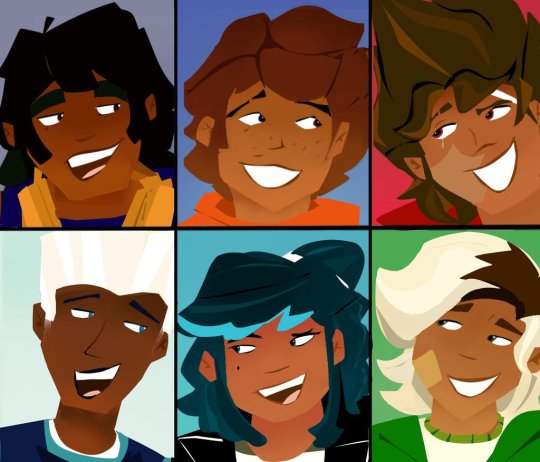
6teen x tlnm au....walk with me..... The ninjas getting a job at the mall.....
510 notes
·
View notes
Text
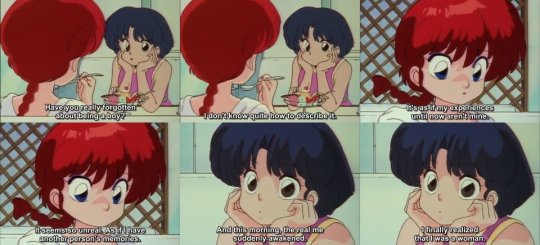
Thinkin bout that time Ranma emotionally ruined me
15K notes
·
View notes
Text



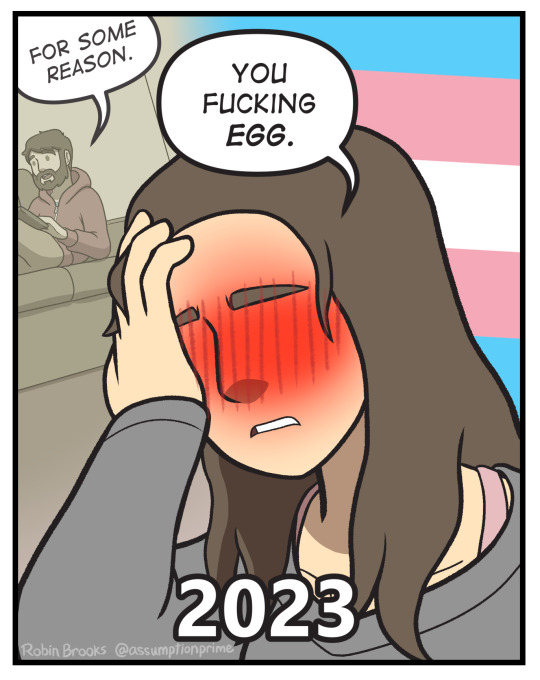
"Some Reason"
Saotome School Secret Technique: Dense As A Brick!
Twitter / Bluesky / Patreon / Instagram
(description on the actual alt-text because that apparently works now on this site? nice)
12K notes
·
View notes
Text
I don't think we realize how horrifying it must've been for Golden Cheese Cookie when reviving her kingdom.
She revived them by collecting all of their burnt flour and limbs and using the magic from her soul jam. That means she had to go around collecting the piles and piles of her fallen subjects who must've not even been recognizable at that point. How long did it take?


Do you SEE how much their is? It completely blocked out the sand until there was nothing but dark flour and black dust in the desert. And all of those are the fallen subjects she loved so dearly.
No wonder she hid her kingdom when she revived them all. She couldn't live through that again.
3K notes
·
View notes
Text
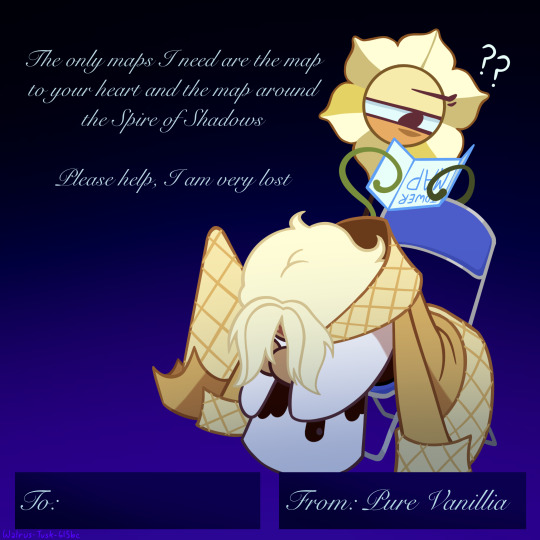
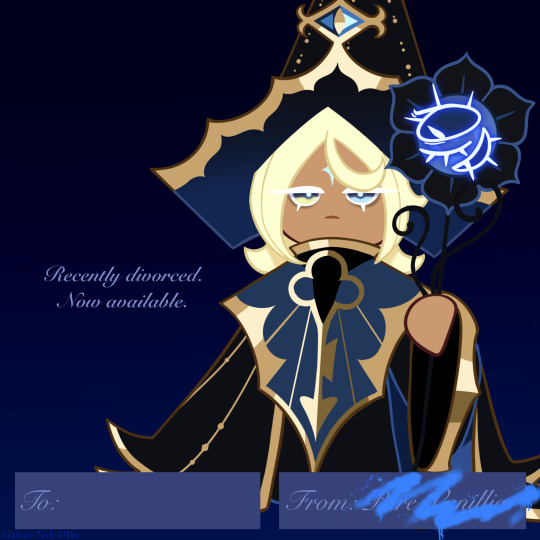
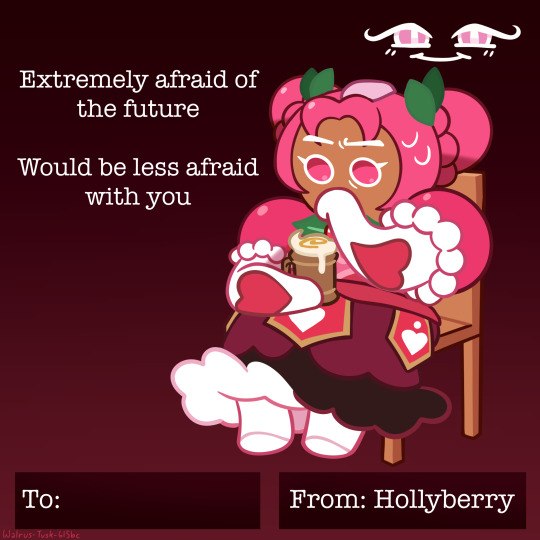
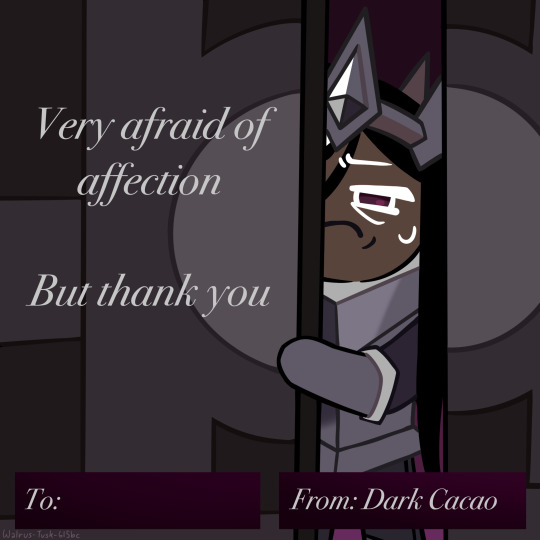

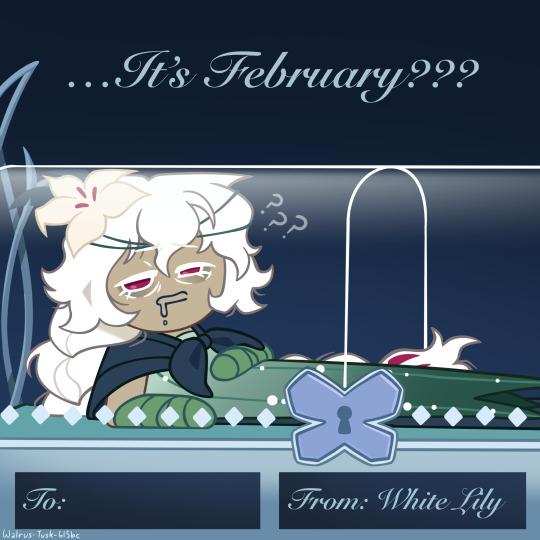
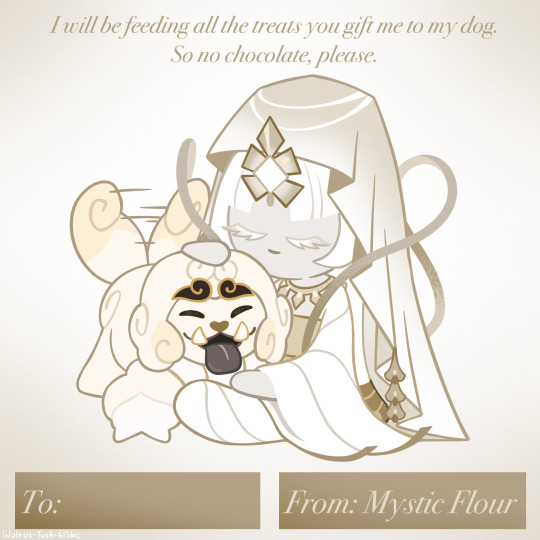
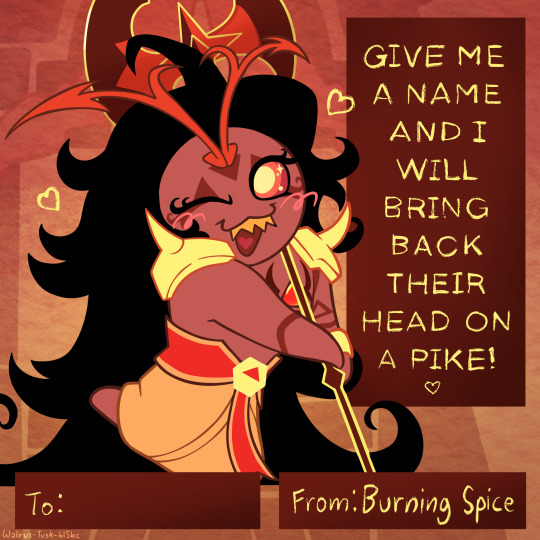
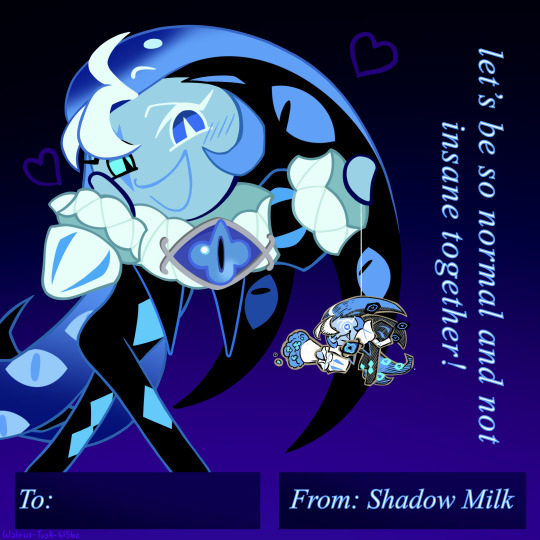
All of the St. Valencringe cards I made for the CRK server contest!
Idk who would even use these, but they’re all free to use with credit lmao
15K notes
·
View notes
Text

So how did everyone’s first encounter with their Beast go?
13K notes
·
View notes
Text



art collab with my #1 pookie @scandalous-dirtcup !!
ohhhhhh yeahhhh we COOKED WITH THIS ONE
super late upload whoopsies🤷♀️
225 notes
·
View notes








